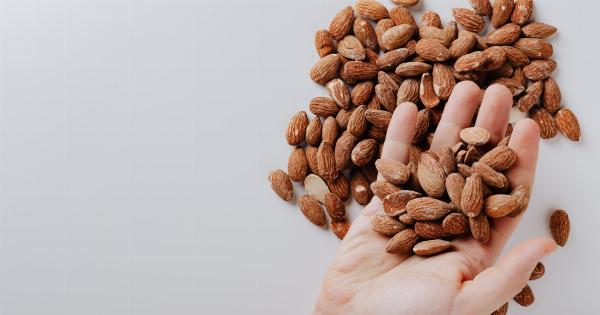Protein is an important nutrient that plays a vital role in various bodily functions. It is a macronutrient that is essential for building and repairing tissues, producing enzymes and hormones, and supporting a healthy immune system.
While protein can be found in various food sources, some individuals may not be consuming enough to meet their daily needs. Here are some signs that you may not be getting enough protein in your diet:.
1. Constant Fatigue
One of the common signs that you’re not getting enough protein is experiencing constant fatigue. Protein helps provide the body with energy, and inadequate protein intake can leave you feeling tired and sluggish throughout the day.
If you often feel exhausted, even after a good night’s sleep, it might be a sign that you need to increase your protein intake.
2. Slow Recovery and Poor Muscle Growth
If you engage in regular physical activity or exercise, insufficient protein intake can hinder your muscle recovery and growth.
Protein plays a crucial role in repairing and building muscle tissue, and without enough of it, your muscles may take longer to recover from workouts and may not grow as effectively. If you notice that your muscles are not recovering properly or you’re not making progress in your fitness routine, you should consider increasing your protein intake.
3. Hair Loss
While hair loss can be caused by a variety of factors, including genetics and medical conditions, inadequate protein intake has been linked to hair loss or thinning of hair.
Hair follicles are primarily made up of protein, and insufficient protein intake can result in weakened hair follicles, leading to hair loss. If you’re experiencing significant hair loss, it is worth evaluating your protein consumption and ensuring you’re meeting your body’s requirements.
4. Frequent Illnesses and Weakened Immune System
Protein plays a crucial role in supporting a healthy immune system. It helps produce antibodies and immune cells that defend the body against infection and illness.
If you find yourself frequently falling sick or having a hard time recovering from illnesses, it could be an indication of inadequate protein intake. Strengthening your immune system by increasing protein consumption can help protect your body from viruses, bacteria, and other pathogens.
5. Constant Cravings for Sweets and Carbohydrates
A significant sign that you may not be getting enough protein is experiencing constant cravings for sweets and carbohydrates. Protein helps regulate blood sugar levels and keeps you feeling satisfied and full for longer periods.
Without sufficient protein, you may experience frequent hunger pangs, leading to cravings for sugary and carb-rich foods. If you find yourself constantly reaching for these types of foods, it might be an indication that you need to incorporate more protein into your diet.
6. Slow Wound Healing
Protein is a crucial component for wound healing as it helps in the production of new cells and the repair of damaged tissues.
If you notice that your wounds are healing slowly or you’re more prone to infections, it could be a sign of inadequate protein intake. Ensuring you have enough protein in your diet can support the healing process and promote better overall recovery.
7. Mood Swings and Irritability
Protein plays a role in regulating the production of neurotransmitters, such as serotonin and dopamine, which are important for maintaining stable moods and emotions.
Inadequate protein intake can lead to imbalances in these neurotransmitters, resulting in mood swings, irritability, and difficulty concentrating. If you notice significant changes in your mood or have trouble managing your emotions, it’s worth examining your protein consumption.
8. Swollen or Brittle Nails
Insufficient protein intake can also affect the health and appearance of your nails. Protein is essential for nail growth and strength.
If your nails are frequently brittle, weak, or prone to breaking, it may indicate that you’re not getting enough protein in your diet. Consuming adequate protein can help improve nail health and promote stronger and healthier nails.
9. Edema and Fluid Retention
Protein plays a role in maintaining fluid balance in the body. Inadequate protein intake can lead to edema, characterized by swelling in the hands, feet, and ankles.
Edema occurs when there’s an imbalance of fluids and electrolytes in the body, and protein helps regulate this balance. If you frequently experience fluid retention or notice swelling in your extremities, increasing your protein intake may help alleviate these symptoms.
10. Poor Skin Health
Protein is essential for skin health, as it helps in the production of collagen and elastin, which are responsible for maintaining the skin’s elasticity and structure.
Inadequate protein intake can result in dry, flaky skin, a lackluster complexion, and an increased risk of developing wrinkles and sagging skin. If you’re concerned about your skin’s appearance or notice these signs, it may be beneficial to include more protein-rich foods in your diet.
In conclusion, protein is a vital nutrient that plays numerous essential roles in the body.
Inadequate protein intake can lead to a variety of signs and symptoms, including constant fatigue, slow recovery and poor muscle growth, hair loss, frequent illnesses, cravings for sweets and carbohydrates, slow wound healing, mood swings and irritability, swollen or brittle nails, edema and fluid retention, and poor skin health. If you’re experiencing any of these signs, it’s important to assess your protein consumption and make necessary adjustments to ensure you’re meeting your body’s protein needs.



























